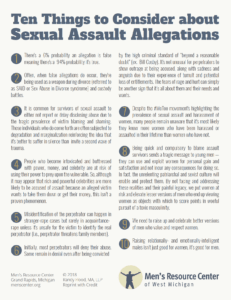The #MeToo movement has shone a light on the role society plays in creating an environment where sexual assault and misconduct flourish – oftentimes unreported or disregarded. Despite the real potential for derision and ruin, women (and men) have found the courage and support they need to come forward and speak their truth. Business, industry, and the political world are being put on notice: this type of behavior cannot go on. And yet, many unwittingly continue to buttress the pillars of sexual objectification and entitled sexuality by proliferating myths and misinformation about sexual assault and misconduct allegations. If we’re going to effectively discern the truth when allegations surface, we need to know the facts and trends. Otherwise, we do more to unwittingly perpetuate the problem. Still – and perhaps, more importantly – the question remains: What are we doing to stop this behavior from happening in the first place? The reality is that we have a real problem with untethered sexuality in our society and we need to address it. To help move that conversation forward, here are ten things to consider when first hearing about sexual assault allegations.
Ten Things to Consider about Sexual Assault Allegations
- There’s a six-percent (6%) probability an allegation is false meaning there’s a 94% probability it’s true.
- Often, when false allegations do occur, they’re being used as a weapon during divorce (referred to as SAID or Sex Abuse in Divorce syndrome) and custody battles.
- It is common for survivors of sexual assault to either not report or delay disclosing abuse due to the tragic prevalence of victim blaming and shaming. Those individuals who do come forth are often subjected to degradation and marginalization reinforcing the idea that it’s better to suffer in silence than invite a second wave of trauma.
- People who become intoxicated and buttressed with power, money, and celebrity are at risk of using their power to prey upon the vulnerable. So, although it may appear that rich and powerful celebrities are more likely to be accused of assault because an alleged victim wants to take them down or get their money, this isn’t a proven phenomenon.
- Misidentification of the perpetrator can happen in stranger-rape cases but rarely in acquaintance-rape unless it’s unsafe for the victim to identify the real perpetrator (i.e., perpetrator threatens family members).
- Initially, most perpetrators will deny their abuse. Some remain in denial even after being convicted by the high criminal standard of “beyond a reasonable doubt” (ex. Bill Cosby). It’s not unusual for perpetrators to show outrage at being accused, along with sadness and anguish due to their experience of tumult and potential loss of entitlements. The tears of rage and hurt can simply be another sign that it’s all about them and their needs and wants.
- Despite the #MeToo movement’s highlighting the prevalence of sexual assault and harassment of women, many people remain unaware that it’s most likely they know more women who have been harassed or assaulted in their lifetime than women who have not.
- Being quick and compulsory to blame assault survivors sends a tragic message to young men—they can use and exploit women for personal gain and satisfaction and not incur any consequences for doing so. In fact, the unrelenting patriarchal and sexist culture will enable and protect them. By not facing and addressing these realities and their painful legacy, we put women at risk and elevate lesser versions of men who end up viewing women as objects with which to score points in woeful pursuit of a toxic masculinity.
- We need to raise up and celebrate better versions of men who value and respect women.
- Raising relationally- and emotionally-intelligent males isn’t just good for women, it’s good for men.
Download a printable version of Ten Things to Consider about Sexual Assault Allegations.
Changing Our Response
When allegations are lodged and we begin to weigh in as concerned citizens to protect victims both of true and false allegations, we need to do so with solid information. Otherwise, we become complicit in perpetuating the very reason the problem persists. It doesn’t help when we become tribal and reactively root and support the alleged perpetrator or victim. How we “feel” about the allegations isn’t what matters; what matters is social justice, truth-telling, and personal accountability.

The burden to change is on society as a whole. For too long we have raised our children to believe that boys are completely rough and tumble and girls are totally restrained and compliant. Those false ideals have set our children up for failure, denying them the right to express their full humanity. What if our aspirations were to raise individuals who honor the rights of each person and cultivate a society that aspires to social justice, not tribal victories.
Working Toward Change
There’s not a quick fix, but if you or your organization are ready to work toward change, the Men’s Resource Center is ready to work with you. To learn more about issues that affect men and to see the services we offer to individuals and organizations. You can also call at (616) 456-1178.


Leave A Comment